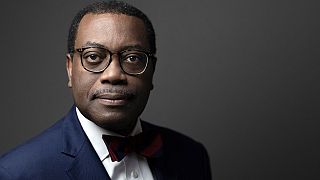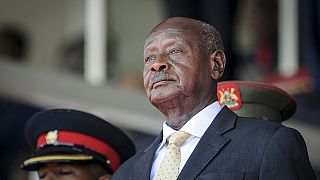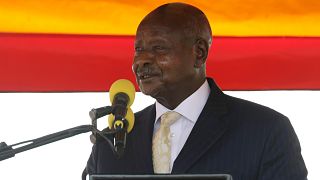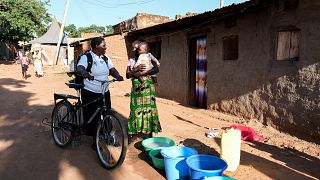Interview
On this special interview segment on Africanews, UNICEF goodwill Ambassador Vanessa Nakata. The Ugandan climate activist plays an instrumental role in amplifying African voices in the climate crisis global conversation.
You were recently at the World Economic Forum in Davos, Switzerland, and before that last year you were in Sharm el Sheikh for the U.N. Climate Conference. Did you hear anything that made you believe world leaders are keeping the pace on climate action?
Vanessa Nakate: Well, thank you. I can talk about the COP 27, which is in Egypt. One thing that we saw was the establishment of a 'loss and damage fund'. But it's important to know that that fund is still an empty bucket. And we need real money in the fund to help communities that are on the frontlines of the climate crisis. And when it comes to the World Economic Forum, honestly, most of the perspectives at Davos come from the West. Global issues are talked about from a Western perspective.
Problems like the energy crisis are talked about from the perspective of businesses and families in Europe and North America. And yet lower income countries are suffering from multiple crises at once. Economic problems such as high debt burdens amidst several times worse after extreme weather events. So for me, the experience at Davos and the experience at seven, it points out how, you know, the communities that are on the frontlines of the climate crisis are still not on the front lines of these discussions.
You know energy poverty is one of many issues Africans are grappling with on a daily basis in your home country. You launched the Vash Green Schools Project, which aims to install solar panels in remote areas. What has the impact been so far and what are the challenges?
Vanessa Nakate: The Vash Green Schools Project is one that has started in 2019 to bring solar panels and clean cooking stoves to schools in Uganda, because I believe that no option is too small to transform the world. And as I speak right now, we've done installations in 33 schools impacting about 11,000 children.
But this is a project that is grassroots, led by activists and organised by activists, young activists. But we need more resources, real systematic change from our leaders to be able to transform the work, to be able to address issues of energy, especially in the countries that are already suffering energy poverty for decades.
We may not love this fact, but generating electricity and energy emits carbon dioxide gas. Industrialised economies rely on that in Africa and the global South at large. Many countries are told to abandon projects out of environmental concern. Still, they are not the biggest carbon polluters. How do you think they can fairly industrialise without their resources?
Vanessa Nakate: Well, I can say that clean energy is the only investment that makes sense right now, especially when you look at the impact of the climate, you know, the impact of the climate crisis in so many communities. You know, there is no excuse. We've seen that fossil fuels have caused this crisis that has left, for example, 30 million people on the brink of starvation in the Horn of Africa.
And these same fossil fuels have caused the air pollution that kills 8.7 million people around the world every year. So we see the challenges of investing in fossil fuels. The U.N. Secretary general, Antonio Guterres, said that the business models of fossil fuel companies are inconsistent with human survival. The IEA has clearly said that if we want to limit global temperatures below 1.5 degrees, then we cannot have any new fossil fuel investment.
So I believe that the pathway of true development to development means protecting people and also having the economies, having people protected, having ecosystems and the planet protected. It's one thing to see economic development while people are being left suffering, you know, while the planet is being destroyed. So for me, that investment that we need not only across the global South, but across the world is clean and renewable energy.











01:00
Pix of the Day: July 3, 2025
01:45
From Uganda to NYC: Zohran Mamdani's rise in American politics
01:22
Ugandan-born Zohran Mamdani declares victory in New York Democratic mayoral primary
01:36
CO2 emissions on track to push Earth beyond 1.5 degree threshold by 2028, report finds.
01:30
Abu Dhabi hosts first Global South Economic Forum
02:19
Israel deports Greta Thunberg, other activists from Gaza aid flotilla